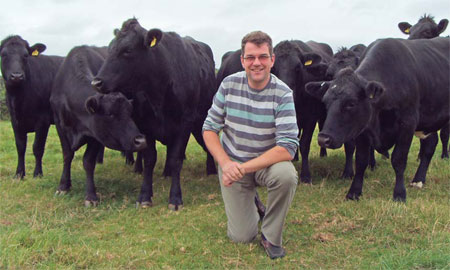Seeking greener pastures

| British beef farmers such as Paul Westway, owner of the Sterling Sires farm in South England, expect to commence exports to China in the near future. Provided to China Daily |
British livestock farmers look to step up beef exports to China
British beef farmers are looking to gain a foothold in China, as the discussions on getting a formal export license enter the advanced stages of negotiation.
The farmers are hoping to emulate British pork farmers who got the green light for exports to China last year. The move had helped British agri-food exports become more competitive against other European farmers who are also trying to make inroads in China.
Beef imports from European countries were stopped by China after the outbreak of mad cow disease in the late 1980s, and the latest move by British farmers is an attempt to reopen the lucrative market.
"To be able to export to China will be a big achievement for our industry," says Joanne Pugh, assistant director of Britain's National Beef Association.
"China is a big market for expensive cuts of beef, like steaks, sirloin and rumps," Pugh says, adding that the association is expecting to get an export certificate by 2014-15 at the earliest.
Last December, the beef association, alongside members of Eblex, the organization for the English beef and sheep industry, held a meeting with five top vets from the Henan Provincial Animal Husbandry Bureau in China on the issue of exports.
According to the association, the Chinese delegates were keen to learn from their British counterparts how they could improve the quality and quantity of their beef production, with a focus on genetics, feeding and meat processing.
British cattle genetics, in the form of frozen bovine semen, is also hoping to commence exports to China soon.
Paul Westway, owner of Sterling Sires, a farm in South England specializing in beef genetics, says there has been considerable interest from China for the bovine semen on his farm.
Westway says that three Chinese groups have already visited him including farmers, vets and representatives from the Ministry of Agriculture.
"The Chinese farmers are very keen to buy cattle breeds that yield more meat per cattle, ones that feed on grass, and ones that live outdoors. Based on these characteristics, the British cattle breed Aberdeen Angus has been found to be a perfect choice," he says.
Sterling Sires exports frozen bovine semen to more than 40 countries, of which the largest market is currently Brazil, making up 30 percent of the farm's exports.
British beef farmers' hopes of exporting to China had earlier got a much-needed boost after the nation's pork industry got a market entry in China.
Peter Hardwick, international manager of Bpex, the organization for the British pig industry, was in China earlier this month, trying to finalize the finer details of the agreement and discuss the logistics of the trade with Chinese authorities.
"We hope to export fifth quarter products to China, including offal products, ears, tails, stomach and intestines, as they fetch high prices there," Hardwick says.
In China, pig's stomach is a popular restaurant staple, while trotters are considered a delicacy.
Hardwick explains that Britain also sells parts of pigs to countries that pay a higher premium for them - pork belly to South Korea, femur bones to Japan, fifth quarter products to Hong Kong and ribs to the United States.
Negotiations to open the Chinese market for British pork actually began in 2004, but got interrupted by the outbreak of foot-and-mouth disease in 2007.
Export licenses were finally granted in 2011 during Chinese Premier Wen Jiabao's visit to Britain.
"It has taken longer than we have hoped, but we understand that the Chinese people need to ensure the safety of the products," Hardwick says.
British pig genetics has also recently witnessed an increase in exports, although the trade first commenced in 1922.
Unlike cattle genetics that can be frozen into bovine semen, pig genetics are exported in the form of live pigs.
Chris Jackson, export director of British Pig Association, says that China is the largest export market for British pigs, accounting for 30 percent of last year's total.
"In China for instance, the average number of piglets reared per sow per year is still only 14. With our better genetics in the UK, we're looking at about 30 pigs reared per sow per year," he says.
"Chinese pigs also take 250 days to grow from birth to 250 kg, whereas British pigs only take 98 days."
Jackson says that although other eastern European countries such as Russia and Ukraine buy pigs from Britain, Chinese buyers often take the best breeds.
Britain's export of pigs to China has increased from 100 pigs per year in 1922 to 2,500 now, according to Jackson, who expects the exports could quadruple in three years.
Removing trade barriers for the food industry has recently become a priority for the British government.
In a UK government paper titled Farming, Food and Drinks Action Plan issued in January, food exports to emerging countries such as China was identified as an engine for wider economic growth in the UK.
The report included plans to simplify export paperwork, provide trade finance guarantees and lobbying services to remove trade barriers overseas.
"This is the first time we have had (such a) plan," Terry Jones of the Food and Drink Federation told the Financial Times.
Hope from Europe
Meanwhile, many other European countries are also vying to increase exports to China.
Denmark hopes to export to China 14 billion Danish krone ($2.5 billion, 1.9 billion euros) of food products this year, a 20 percent increase from last year, with pork being a key export.
Nearly 170 containers of pork are currently shipped from Denmark to China every week.
Ireland is looking to increase its agri-food exports to China, with strong demand from China likely to lead Ireland's total export growth by nearly 42 percent in 2020 from the 2007-09 average.
"China is an exciting market for the agri-food products that Ireland produces, like protein-based dairy products, meat and seafood," Simon Coveney, Ireland's agriculture minister told China Daily ahead of Chinese Vice-President Xi Jinping's visit to Ireland earlier this year.
Scotland has also launched a food and drink strategy for Asia in December, targeting a 50 percent increase in the value of exports by 2016.
Alex Salmond, Scotland's first minister, signed an agreement with Chinese Vice-Premier Li Keqiang last year, which opened the Chinese market for Scottish salmon for the first time.
Salmond says that Li had pointed out that even if 1 percent of the people of China decided to take the opportunity to eat Scottish salmon, Scotland would have to double its production levels.
cecily.liu@chinadaily.com.cn
(China Daily 03/30/2012 page6)
Today's Top News
- China warns Japan against interference
- Nation's euro bond sale shows investors' confidence
- No soft landing for Tokyo's hard line
- Commerce minister urges US to increase areas of cooperation
- Strong demand for China's sovereign bonds signals global confidence
- Ministry urges Japan to 'maintain self-respect'
































